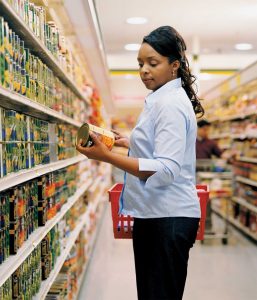Bulletin #4304, A Food Pantry Wish List
Food for ME: Citizen Action for Community Food Recovery
Originally prepared by C. Joyce Kleffner, Extension educator, University of Maine Cooperative Extension.
Revised and updated by Kate Yerxa, Extension educator, University of Maine Cooperative Extension.
Revised and updated by University of Maine Cooperative Extension staff, 2024, 2025
For information about UMaine Extension programs and resources, visit extension.umaine.edu.
Find more of our publications and books at extension.umaine.edu/publications/.
Take this chart with you when you go grocery shopping to help you choose healthy foods to donate to the food pantries, or use it to help you organize a community food drive.
Check with your county University of Maine Cooperative Extension office for a listing of pantries or food assistance programs in your area and accompanying donation information, or visit The Emergency Food Assistance Program the on the Maine Department of Agriculture, Food and Rural Resources website and use the Find Food Assistance Feature.
If you want to donate fresh and frozen fruits and vegetables or other perishable food items, please call the food pantry first to be sure they can accept them. Keep these items refrigerated or frozen to keep them safe.
Food Items to Donate
Protein Foods: Meat, Poultry, Fish, Dry Beans, and Nuts
- canned tuna
- canned chicken
- canned beef stews
- canned salmon
- bean soups
- canned or dried beans
- baked beans
- canned chili
- peanut butter
- canned nuts
Grains: Bread, Cereal, Rice, and Pasta
- rice and rice mixes
- canned pastas
- noodle mixes
- dry noodles and pastas
- macaroni and cheese mix
- cold cereals
- bran cereal
- shredded wheat
- infant cereal
- hot cereal mixes
- oatmeal
- bread, muffin, and pancake mixes
- whole-grain crackers
- granola bars
- graham crackers
- flour
- bread
Dairy: Milk, Yogurt, and Cheese
- infant formula
- nonfat dry milk
- evaporated milk
- instant breakfast drinks
- shelf-stable (UHT) milk (small boxes)
Vegetables
- canned vegetables
- vegetable soup
- canned tomato products
- spaghetti sauce
- baby-food vegetables
- V-8 juice
Fruits
- canned fruit
- raisins
- applesauce
- dried fruits
- baby-food fruit
- fruit leather (100% fruit)
- canned and boxed 100% juice
Oils and Condiments
- vegetable oil
- salad dressing
- syrup
- jelly and jam
- honey
- sugar
- mayonnaise
Non-Food Items to Donate
Certain non-food items may also be welcome. Call your local food pantry to see what they need.
Paper Products
- toilet paper
- paper towels
- napkins
- tissues
Soap Products
- hand soap
- laundry and dish detergent
- cleaning products
Personal Care Products
- shampoo
- toothpaste
- toothbrushes
- shaving cream
- razors
- deodorant
- feminine hygiene products
Extras
- tea
- coffee
- spices
How you can help recover food
To get involved in community food recovery, visit the Maine Gleaning Resources from the National Gleaning Project, or call the USDA National Hunger Hotline 1-866-3-HUNGRY or 1-877-8-HAMBRE operated by Hunger Free America or visit WhyHunger.
Food Recovery Resources
Information in this publication is provided purely for educational purposes. No responsibility is assumed for any problems associated with the use of products or services mentioned. No endorsement of products or companies is intended, nor is criticism of unnamed products or companies implied.
© 1998, 2011, 2024, 2025
Call 800.287.0274 (in Maine), or 207.581.3188, for information on publications and program offerings from University of Maine Cooperative Extension, or visit extension.umaine.edu.
The University of Maine System (the System) is an equal opportunity institution committed to fostering a nondiscriminatory environment and complying with all applicable nondiscrimination laws. Consistent with State and Federal law, the System does not discriminate on the basis of race, color, religion, sex, sexual orientation, transgender status, gender, gender identity or expression, ethnicity, national origin, citizenship status, familial status, ancestry, age, disability (physical or mental), genetic information, pregnancy, or veteran or military status in any aspect of its education, programs and activities, and employment. The System provides reasonable accommodations to qualified individuals with disabilities upon request. If you believe you have experienced discrimination or harassment, you are encouraged to contact the System Office of Equal Opportunity and Title IX Services at 5713 Chadbourne Hall, Room 412, Orono, ME 04469-5713, by calling 207.581.1226, or via TTY at 711 (Maine Relay System). For more information about Title IX or to file a complaint, please contact the UMS Title IX Coordinator at www.maine.edu/title-ix/.


